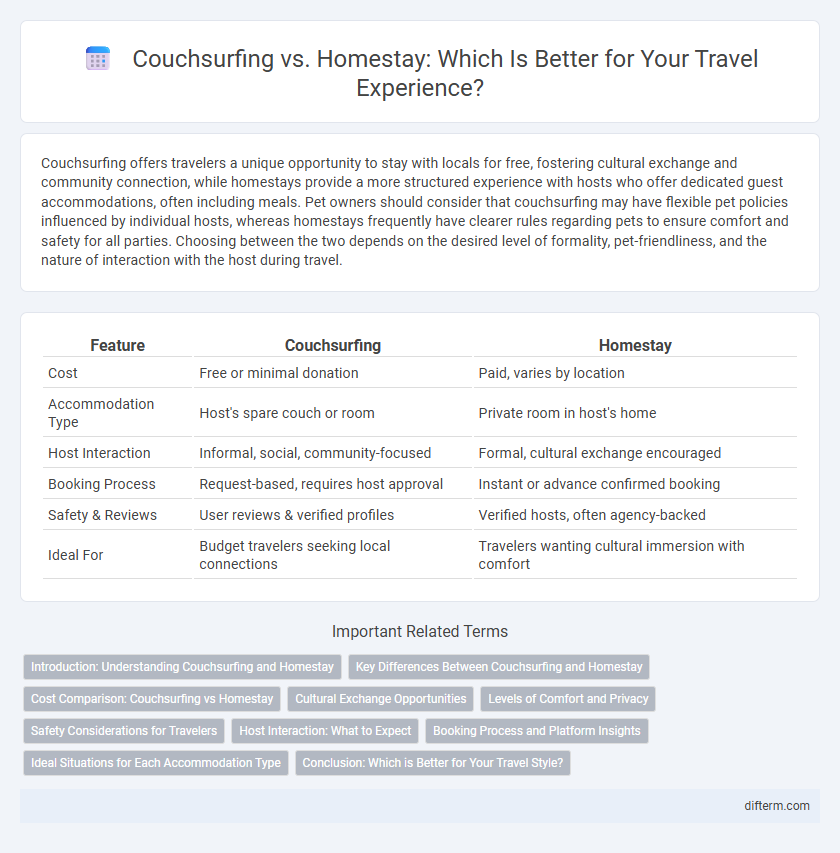Couchsurfing offers travelers a unique opportunity to stay with locals for free, fostering cultural exchange and community connection, while homestays provide a more structured experience with hosts who offer dedicated guest accommodations, often including meals. Pet owners should consider that couchsurfing may have flexible pet policies influenced by individual hosts, whereas homestays frequently have clearer rules regarding pets to ensure comfort and safety for all parties. Choosing between the two depends on the desired level of formality, pet-friendliness, and the nature of interaction with the host during travel.
Table of Comparison
| Feature | Couchsurfing | Homestay |
|---|---|---|
| Cost | Free or minimal donation | Paid, varies by location |
| Accommodation Type | Host's spare couch or room | Private room in host's home |
| Host Interaction | Informal, social, community-focused | Formal, cultural exchange encouraged |
| Booking Process | Request-based, requires host approval | Instant or advance confirmed booking |
| Safety & Reviews | User reviews & verified profiles | Verified hosts, often agency-backed |
| Ideal For | Budget travelers seeking local connections | Travelers wanting cultural immersion with comfort |
Introduction: Understanding Couchsurfing and Homestay
Couchsurfing connects travelers with local hosts offering free accommodations on sofas or spare beds, fostering cultural exchange and community immersion. Homestay involves staying in a host's home, often with meals and deeper engagement in family life, providing a more structured and immersive cultural experience. Both options promote authentic local interactions but differ in cost, commitment, and level of accommodation provided.
Key Differences Between Couchsurfing and Homestay
Couchsurfing offers free accommodation by staying with locals who share their home space temporarily, promoting cultural exchange through informal social interactions. Homestay provides a paid, more structured lodging experience in a local family's home, often including meals and a stable environment suitable for longer stays. The key differences lie in cost, level of privacy, and the type of immersive cultural engagement each facilitates.
Cost Comparison: Couchsurfing vs Homestay
Couchsurfing offers a free accommodation option, significantly reducing travel expenses compared to homestays, which typically charge a fee ranging from $20 to $60 per night depending on location and amenities. While homestays provide more structured lodging with meals and privacy, the cost can accumulate quickly, especially for longer stays. Travelers prioritizing budget-friendly experiences often prefer couchsurfing to maximize savings and extend their trip duration.
Cultural Exchange Opportunities
Couchsurfing offers immersive cultural exchange by connecting travelers with local hosts willing to share their daily lives and customs, fostering authentic interpersonal interactions. Homestays provide structured cultural experiences within a host family setting, allowing guests to participate in traditional routines and regional practices in a more organized environment. Both options enhance cultural understanding, but couchsurfing emphasizes spontaneous social engagement while homestays focus on deeper integration into family life.
Levels of Comfort and Privacy
Couchsurfing offers a more casual and budget-friendly lodging experience, often involving shared spaces that may limit privacy but foster social interaction. Homestays typically provide a higher level of comfort with private rooms and personalized amenities, ensuring greater privacy and a more stable environment. Travelers seeking immersive cultural experiences with moderate comfort might prefer couchsurfing, while those prioritizing comfort and privacy generally choose homestays.
Safety Considerations for Travelers
Couchsurfing involves staying with local hosts often verified through community reviews and profiles, which can enhance safety, but requires careful vetting and communication to mitigate risks. Homestays typically offer a more structured environment with formal agreements and background checks, providing an added layer of security for travelers. Both options demand travelers remain vigilant by researching host reputations, sharing travel plans with trusted contacts, and prioritizing personal comfort and boundaries.
Host Interaction: What to Expect
Couchsurfing offers travelers immersive host interaction, often fostering spontaneous cultural exchanges and local insights through shared living spaces. Homestays provide a more structured experience with dedicated hosts who typically offer personalized meals and guided activities, enhancing cultural understanding. Both options allow for meaningful connections but vary in the depth and style of host engagement.
Booking Process and Platform Insights
Couchsurfing offers a community-based platform where travelers request stays directly from hosts through personalized messages, emphasizing social connection and trust-building via profiles and reviews. Homestay platforms streamline bookings with secure payment systems and instant or confirmed reservations, prioritizing convenience and verified accommodations. Both platforms provide traveler reviews, but couchsurfing relies heavily on host hospitality, while homestays focus on professional hosting and standardized amenities.
Ideal Situations for Each Accommodation Type
Couchsurfing suits budget travelers seeking cultural exchange and local insights in urban environments with flexible schedules, while homestays are ideal for those desiring immersive family experiences and structured stays in rural or traditional settings. Couchsurfing fosters spontaneous connections and social interaction, benefiting solo travelers or backpackers. Homestays offer comfort and routine, catering to families or travelers prioritizing stability and deeper community engagement.
Conclusion: Which is Better for Your Travel Style?
Choosing between couchsurfing and homestay depends on your travel preferences and interaction level; couchsurfing suits budget travelers seeking local connections and cultural exchange, while homestays offer a more structured, comfortable environment with immersive family experiences. For solo adventurers prioritizing social engagement and flexibility, couchsurfing provides diverse networking opportunities and authentic local insights. Travelers valuing privacy, stability, and deeper cultural immersion may find homestays better align with their style, enhancing safety and comfort during longer stays.
couchsurfing vs homestay Infographic

 difterm.com
difterm.com